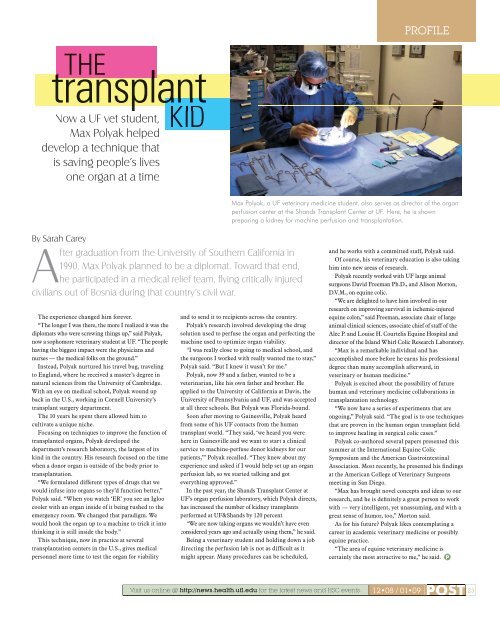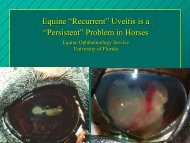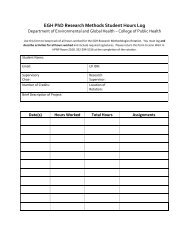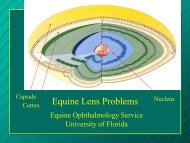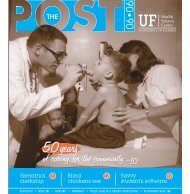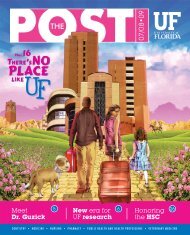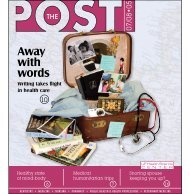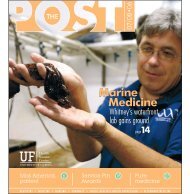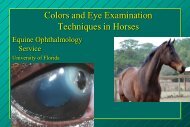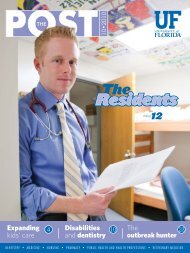DISSECTING - UF Health Podcasts
DISSECTING - UF Health Podcasts
DISSECTING - UF Health Podcasts
- No tags were found...
You also want an ePaper? Increase the reach of your titles
YUMPU automatically turns print PDFs into web optimized ePapers that Google loves.
PROFILETHEtransplantNow a <strong>UF</strong> vet student,Max Polyak helpeddevelop a technique thatis saving people’s livesone organ at a timeKIDMax Polyak, a <strong>UF</strong> veterinary medicine student, also serves as director of the organperfusion center at the Shands Transplant Center at <strong>UF</strong>. Here, he is shownpreparing a kidney for machine perfusion and transplantation.By Sarah CareyAfter graduation from the University of Southern California in1990, Max Polyak planned to be a diplomat. Toward that end,he participated in a medical relief team, fl ying critically injuredcivilians out of Bosnia during that country’s civil war.The experience changed him forever.“The longer I was there, the more I realized it was thediplomats who were screwing things up,” said Polyak,now a sophomore veterinary student at <strong>UF</strong>. “The peoplehaving the biggest impact were the physicians andnurses — the medical folks on the ground.”Instead, Polyak nurtured his travel bug, travelingto England, where he received a master’s degree innatural sciences from the University of Cambridge.With an eye on medical school, Polyak wound upback in the U.S., working in Cornell University’stransplant surgery department.The 10 years he spent there allowed him tocultivate a unique niche.Focusing on techniques to improve the function oftransplanted organs, Polyak developed thedepartment’s research laboratory, the largest of itskind in the country. His research focused on the timewhen a donor organ is outside of the body prior totransplantation.“We formulated different types of drugs that wewould infuse into organs so they’d function better,”Polyak said. “When you watch ‘ER’ you see an Igloocooler with an organ inside of it being rushed to theemergency room. We changed that paradigm. Wewould hook the organ up to a machine to trick it intothinking it is still inside the body.”This technique, now in practice at severaltransplantation centers in the U.S., gives medicalpersonnel more time to test the organ for viabilityand to send it to recipients across the country.Polyak’s research involved developing the drugsolution used to perfuse the organ and perfecting themachine used to optimize organ viability.“I was really close to going to medical school, andthe surgeons I worked with really wanted me to stay,”Polyak said. “But I knew it wasn’t for me.”Polyak, now 39 and a father, wanted to be aveterinarian, like his own father and brother. Heapplied to the University of California at Davis, theUniversity of Pennsylvania and <strong>UF</strong>, and was acceptedat all three schools. But Polyak was Florida-bound.Soon after moving to Gainesville, Polyak heardfrom some of his <strong>UF</strong> contacts from the humantransplant world. “They said, ‘we heard you werehere in Gainesville and we want to start a clinicalservice to machine-perfuse donor kidneys for ourpatients,’” Polyak recalled. “They knew about myexperience and asked if I would help set up an organperfusion lab, so we started talking and goteverything approved.”In the past year, the Shands Transplant Center at<strong>UF</strong>’s organ perfusion laboratory, which Polyak directs,has increased the number of kidney transplantsperformed at <strong>UF</strong>&Shands by 120 percent.“We are now taking organs we wouldn’t have evenconsidered years ago and actually using them,” he said.Being a veterinary student and holding down a jobdirecting the perfusion lab is not as difficult as itmight appear. Many procedures can be scheduled,and he works with a committed staff, Polyak said.Of course, his veterinary education is also takinghim into new areas of research.Polyak recently worked with <strong>UF</strong> large animalsurgeons David Freeman Ph.D., and Alison Morton,D.V.M., on equine colic.“We are delighted to have him involved in ourresearch on improving survival in ischemic-injuredequine colon,” said Freeman, associate chair of largeanimal clinical sciences, associate chief of staff of theAlec P. and Louise H. Courtelis Equine Hospital anddirector of the Island Whirl Colic Research Laboratory.“Max is a remarkable individual and hasaccomplished more before he earns his professionaldegree than many accomplish afterward, inveterinary or human medicine.”Polyak is excited about the possibility of futurehuman and veterinary medicine collaborations intransplantation technology.“We now have a series of experiments that areongoing,” Polyak said. “The goal is to use techniquesthat are proven in the human organ transplant fieldto improve healing in surgical colic cases.”Polyak co-authored several papers presented thissummer at the International Equine ColicSymposium and the American GastrointestinalAssociation. Most recently, he presented his findingsat the American College of Veterinary Surgeonsmeeting in San Diego.“Max has brought novel concepts and ideas to ourresearch, and he is definitely a great person to workwith — very intelligent, yet unassuming, and with agreat sense of humor, too,” Morton said.As for his future? Polyak likes contemplating acareer in academic veterinary medicine or possiblyequine practice.“The area of equine veterinary medicine iscertainly the most attractive to me,” he said. PVisit us online @ http://news.health.ufl.edu for the latest news and HSC events. 12•08 / 01•09POST23


